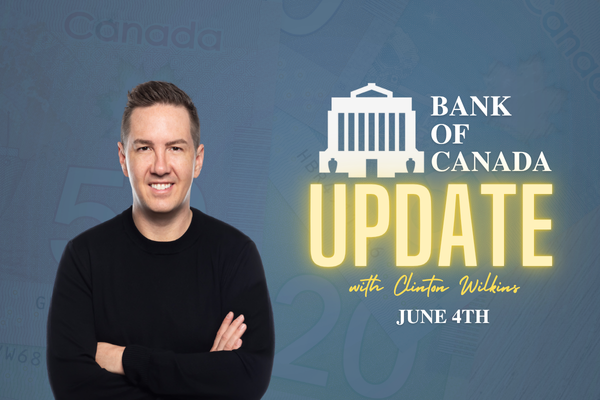Clinton Wilkins joins Todd Veinotte on 95.7 News Radio to discuss The Bank of Canada holding its key policy rate at 2.75%, marking the first pause after seven consecutive cuts.
Global News Morning: Talking about credit
Clinton Wilkins sits down with Alyse Hand from Global News Morning to give credit advice and talk a bit more about your mortgage application.
Don’t feel like watching the video? Check out the credit advice video transcript below.
Transcript:
Credit advice
Alyse: [00:00:00] There is so much to consider when buying your first home, and your second, and third. But, sometimes the most basic things to consider can be forgotten or overlooked, including knowing your credit score and how it may impact the biggest purchase of your life. Clinton Wilkins is a senior mortgage adviser with Centum Home Lenders Limited here to help us better understand credit and how it can impact getting a mortgage. And you are the expert. When we talk about mortgages and credit.
Clinton: [00:00:27] Thanks for having me, Alyse.
Alyse: [00:00:28] Thanks for being here. So let’s talk about step one. You’re interested in buying a home, of course, most importantly, the mortgage for that.
Clinton: [00:00:36] Yeah and I think the first step is getting a pre-approval.
Alyse: [00:00:38] Right.
A bit more about pre-approvals
Clinton: [00:00:38] And when you get a preapproval, you look at three things. We look at income. We look at assets and we obviously look at your credit. And credit really determines the risk to the lender. And it can determine a lot of things like how much you need to do as a down payment and what interest rate you may get.
Alyse: [00:00:53] Ok. So on a very basic level, Clinton, tell us what credit is.
Clinton: [00:00:57] Ok. There are two credit reporting agencies in Canada. There are TransUnion and Equifax. And they both have a score out of 900 and they make up lots of different things. But the majority, it’s your credit inquiries, it’s your utilization and it’s your payment history. They can also pull in things like your addresses, date of birth, your sin number, as well as any public records like collections, bankruptcies or consumer proposals.
What about credit?
Alyse: [00:01:22] So for credit, do we want that number to be high or low.
Clinton: [00:01:26] You want it to be high. So out of 900, OK. And typically anything over seven or 720 is considered stellar. And typically, when we’re looking at mortgage lending, if we’re looking at in the A world a score of 650 or better, it’s typically kind of the benchmark. They will go as low as 600. But there really needs to be a story in there. Is there an explanation about why is it low? Is it because of utilization? And you’re doing a refinance to pay off some of that unsecured debt? Or are you always at its previous payment history? Because at the end of the day, the lender wants to understand what the risk is and they want to make sure that they’re getting paid back.
Alyse: [00:01:57] How do we build credit? What is the best way in your experience to build credit and have better credit to get that mortgage?
Clinton: [00:02:02] Well, I think, you know, the most important thing is really around the credit mix. So you want to have some installment payments. So that could be like a car loan or maybe a student loan. And you want to have some revolving credit. So credit card line of credit. Typically what we say is you want to keep your utilization low. So, for example, if you have a five thousand dollar limit, you don’t want to go above 30 percent of that limit. Anything above 30 percent will bring down your credit score.
What score do I need?
Alyse: [00:02:24] So what credit score will I need for a mortgage?
Clinton: [00:02:27] Well, typically the minimum is 600 if you want to get a mortgage through a traditional lender. You know, sometimes there are people who have damaged credit and they may have to go to an alternative lender. They might need a larger down payment like 20, 25 percent or even 35 percent or 50 percent down. Every Canadian can get a mortgage. It just depends on how much skin they’re going to need in the game and how costly. But typically, when you’re a first-time homebuyer, we typically see people that have great credit. So typically the score is, you know, 700, 720 plus and they can qualify for anything as low as 5 percent down.
Alyse: [00:03:00] Interesting that you said that, that, you know, what you’re seeing is that most people looking to buy their first home have good credit. I would have thought that I’m looking at my friends and my experiences and we’ve all grown since we’re in our early to mid-20s when you don’t really know a lot about building credit, but you’re seeing people who are quite responsible with their credit.
Clinton: [00:03:16] Yeah. And I would say the majority of Canadians have great credit. I think it’s good. It’s about 90 percent of Canadians have credit that 700 plus. So we’re seeing a lot of people who have great credit. And there are solutions for people that maybe don’t have the best credit and we can work with people, typically what we say is, you know, in 60 months or 72 months, everything can be something that there’s a solution for everything. So any type of late payments or written off accounts or any problems that might have had with your credit, they come off after six years in Nova Scotia.
Alyse: [00:03:44] You’re gonna have to maybe do a little waiting, but it will be worth the wait, right?
There may be a backstory
Clinton: [00:03:47] Well, I think that’s why a pre-approval so important. So it’s looking at your entire situation. And sometimes there are errors on the credit bureau that can be corrected. So when consumers come to an independent, you know, an unbiased mortgage professional like myself, you know, we can really work with you to help fix that credit if there is a problem.
Alyse: [00:04:01] You’re an advocate for these people?
Clinton: [00:04:02] 100%. And, you know, we just don’t have one solution. We’ve access to multiple different lenders. And the only thing that we’re doing every day is mortgage lending. So we can really look at that credit, analyze it and figure out what the best solution is. And sometimes it’s just a plan that might take one, two or three months and we can make a couple of little small changes and really boost that score.
Alyse: [00:04:20] That’s great. You also talk about, you know, everyone has a story. Sometimes we get into debt because it’s totally out of our control. It’s a divorce. It’s a death in the family. There are so many reasons. So you really are there to further get that story from a potential client and maybe help them with that credit score. Right?
Clinton: [00:04:37] And I think the story is so important. You know, life events happen. Like you said, every single day. There’s loss of business, there’s divorce, there are health issues. And sometimes that the blip in the history and that’s explainable, you know, it happens to everyone. You know, there’s things that are just completely outside of your control. And I think if your payment history has been A1 and if you have had some problems, make sure that it’s perfect going forward. And I think that, you know, figure out what the. Problem is, fix it. Correct it. And then lender’s going to look at you in a definitely a better light.
Alyse: [00:05:05] Ok, so there is there is hope for everyone out there. Perhaps you don’t think there is, but if you have a not the best credit there is hope. So that’s good to know. Clinton Thank you for being here. I want to mention, too, Clinton is doing a webinar tomorrow night.
Webinar for credit advice
Clinton: [00:05:17] We’re doing a webinar and people can check it out, check us out on social media. So if they go to Team Clinton Halifax, if you look up, Clinton Wilkins Mortgage Team. We’ll do a post at 9 a.m. and it will have the link to our credit webinar. So if you want to learn more about credit, it’s certainly a good place to start.
Alyse: [00:05:30] Yeah, lots you can learn from TeamClinton.ca. We have a board, too, that just to let our viewers know, tomorrow night, 6:00 to 6:30, the webinar, anyone can get involved. It’s free. You can ask questions. Will you do the webinar tomorrow night? 6-6:30. TeamClinton.ca for a little more information. Hey, Clinton, always great to see you. Thanks for coming in.
Clinton: [00:05:46] Thanks for having me, Alyse.
Looking for more information or other credit advice? Feel free to contact us!


